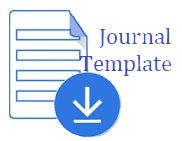Analysis of Students' Mathematical Abstraction Ability by Using Problem-Based Learning Model
Abstract
This study aims to determine students' mathematical abstraction ability, answer process and difficulties faced by students in solving derivative problems. The subjects in this study were 11th grade students of SMA SWASTA AN - NIZAM Medan who were taught with the application of PBL model and scientific approach. The instrument in this study is a formative test used to see the level of mathematical abstraction ability and the answer process given by students. The difficulties faced by students in the process of solving the problems given can be known through the interview process conducted and documented through cell phones. Of the 19 students who took the math abstraction ability test, 4 students had high category math abstraction ability (21%). 11 students have medium category math abstraction ability (58%), and 4 students have low category math abstraction ability (21%). Of the 4 problems given, for the recognition stage, problem no 1 can be solved by all students. problem no 2 can be solved by 17 students, problem no 3 can be solved by 12 students and problem no 4 can be solved by 8 students. The decline also occurred at the representation and structural abstraction stages. After being analyzed based on the process of answers given by students and the results of interviews conducted, the decline was caused by: 1. the level of difficulty of the problem, 2. learning experience, 3. reasoning power and 4. literacy skills of each different student.. In this research, the media used to help the research process is geogebra. The use of this media is only limited to how to solve the problems given in other ways besides the concepts taught at school.
Keywords: Qualitative Research Analysis; Mathematical Abstraction Ability; Problem Based Learning Model
Full Text:
PDFReferences
Amir, Taufiq. (2007). Inovasi Pendidikan Melalui Problem Based Learning: Bagaimana Pendidik Memberdayakan Pembelajar di Era Pengetahuan. Jakarta: Prenadamedia Group
Andi Suryana, Kontribusi Pendidikan Matematika dan Matematika dalam Membangun Karakter Guru dan Siswa, (prosding, ISBN: 978-979-16353-8-7,2012)
Arends. (2007). Model Pembelajaran Problem Based Learning. Jakarta: Bumi Aksara Baharudin dan Esa Nur Wahyuni, Teori Belajar & Pengembangan. Jakarta: Ar- Ruzz Media.
Cifarelli, V. V. 1988. The role of abstraction as a learning process in mathematical problem solving. Doctoral dissertation, Purdue University, Indiana. USA
Desmita. 2012. Psikologi Perkembangan Peserta Didik. Bandung: PT Remaja Rosdakarya.
Dewi I. 2018. The analysis of junior high school students’ mathematical abstraction ability based on local cultural wisdom. Journal of Physics. doi :10.1088/1742-6596/1088/1/012076
Gagne, R.M. (1983). Some Issues in the Psychology of Mathematics Instruction. Journal for Research in Mathematics Education, Volume 14.
Glazer. (2001). Problem Based Instruction. In M. Orey (ED), Emerging Perspective on learning, teching, and technology. (online) terdapat. http//www.coe.uga.edu/epltt/ProblemBasedInstruct.htm.
Kadek Adi Yoga Suputra, 2021, Penerapan Model Problem Based Learning Berbantuan GeoGebra Meningkatkan Hasil Belajar Matematika, Journal of Education Action Research, Volume 5.
Murtianto Hery Yanuar. 2019. Effect of learning using mathematica software toward mathematical abstraction ability, motivation, and independence of students in analytic geometry. Infinity Juornal, Volume 8 No. 2
Nurjannah S. 2020. Literature study: the role of abstraction ability to strengthen students early knowledge in mathematics learning. Journal of Physics: Conference Series. doi:10.1088/1742-6596/1806/1/012064
Petty, James Alan. 1996. The role of reflective abstraction in the conceptualization of infinity and invinite process. Doctoral Dissertation, Purdue Univercity, Indiana
Ratni Yanti, 2019, Penerapan Pendekatan Saintifik Berbantuan Geogebra dalam Upaya Meningkatkan Pemahaman Konsep Matematis Siswa, Jurnal Matematika dan Pendidikan Matematika,Vol. 10.
Sugiyono. 2014. Metode Penelitian Kuantitatif Kualitatif dan R&D. Bandung: Alfabeta. Soedjadi.2000. Kiat Pendidikan Matematika Di Indonesia. Jakarta : Depdiknas
Suhana, Cucu. 2014. Konsep Strategi Pembelajaran. Bandung: Refika Aditama. Supranoto, Kusaeri. 2012. Pengukuran dan Penilaian Pendidikan. Yogyakarta: Graha Ilmu.
Suryana, Andi. 2012. Kontribusi Pendidikan Matematika dan Matematika dalam Membangun Karakter Guru dan Siswa. Prosding ,ISBN: 978-979-16353-8-7.
Trianto. (2013). Mendesain Model Pembelajaran Inovatif- Progresif Konsep, Landasan, dan Implementasinya pada Kurikulum Tingkat Satuan Pendidikan (KTSP). Jakarta: Kencana Prenada Media Grup.
DOI: https://doi.org/10.24114/paradikma.v16i2.48315
Article Metrics
Abstract view : 25 timesPDF - 28 times
Refbacks
- There are currently no refbacks.
Published By: Study Program of Mathematics Education Postgraduate Program of UNIMED This work is licensed under a Creative Commons Attribution 4.0 International License | Visit us at: |





10.png)


